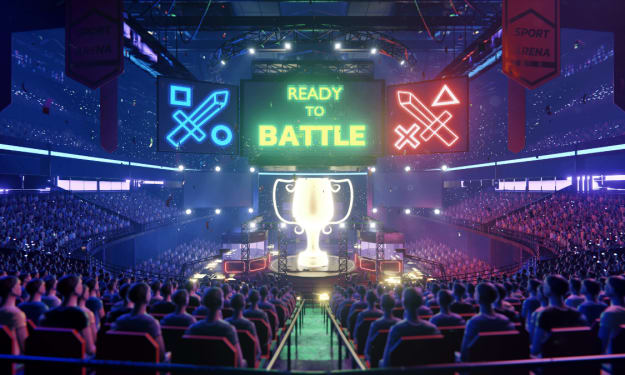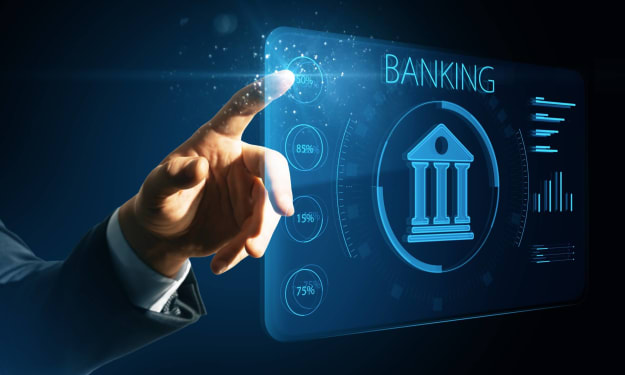Profiting from the Metaverse NFT Marketplace Development: A Comprehensive Guide
This guide is a comprehensive overview of the Metaverse marketplace industry. It includes a market overview, virtual marketplaces, and the trends in the Metaverse.

The Metaverse is a virtual world or collective space where people can interact and engage in various activities such as gaming, socializing, and commerce. One of the main trends in the Metaverse is the rise of user-created content. As technology improves, users can create and share their experiences within the Metaverse. This allows for a more personalized user experience and can be used to create virtual events, experiences, and even businesses.
The trend of social media platforms becoming integrated into the Metaverse is also growing. Platforms such as Facebook, Twitter, and Instagram are now being used to connect users within the Metaverse and allow for more interactive experiences. This trend is also helping to drive the development of virtual and augmented reality experiences.
Another trend in the Metaverse is the growth of virtual currencies and blockchain technology. As more users participate in the Metaverse, the need for a secure and efficient way to transfer money and assets is becoming increasingly important. Blockchain technology is being used to create virtual currencies and tokens that can be used to buy and sell within the virtual world.
Virtual influencers are digital characters who can be used to promote products, services, and experiences within the Metaverse. Companies and individuals create these influencers, and they can be used to create campaigns and reach an audience more interactively and engagingly. Ultimately, the trend of virtual influencers is beginning to gain traction.
Metaverse Market Overview
The Metaverse industry is projected to grow at a CAGR of over 39.1% and be worth $824.53 billion by 2030, according to a PR NewsWire forecast.
The Metaverse industry is projected to grow from $61.8 billion by 2022 to $426.9 billion by 2027, according to the Globe Wire Service.
Over 500 companies have already started building the metaverse.
The Metaverse service already has over 470 million users.
In the Metaverse, Virtual Marketplaces Play a Key Role
➣ Virtual marketplaces in the Metaverse play a crucial role in providing users with a platform to buy, sell, and trade virtual assets and experiences within virtual worlds. These marketplaces serve as a central hub for the exchange of virtual goods and services and provide a seamless and integrated experience for users within the Metaverse.
➣ In the Metaverse, virtual marketplaces provide a space for users to monetize their creations, such as virtual clothing, art, and accessories, as well as experiences, such as virtual real estate, gaming items, and digital collectibles. The use of blockchain technology, particularly non-fungible tokens (NFTs), ensures the authenticity and ownership of virtual assets, making it possible for these assets to have real-world value.
➣ Virtual marketplaces also support the growth and development of the Metaverse by providing a source of revenue for creators and entrepreneurs, encouraging innovation and creativity within the virtual world. This, in turn, drives the overall growth and popularity of the Metaverse, attracting more users and businesses to the platform.
➣ Virtual marketplaces play a vital role in the Metaverse by providing a platform for the exchange of virtual assets and experiences, supporting the growth and development of the virtual world, and creating new opportunities for creators, entrepreneurs, and users.
Related Read:
There are several types of Metaverse NFT marketplaces
The Metaverse NFT marketplaces can be broadly categorized into different types, including:
- Gaming-focused NFT marketplaces: These platforms are primarily designed to trade virtual assets within video games, such as in-game items, skins, and collectibles.
- Social media NFT marketplaces: These platforms allow users to buy, sell, and trade virtual assets within social media networks, such as virtual gifts, stickers, and other digital assets.
- Art and collectibles NFT marketplaces: These platforms sell virtual art and collectibles, such as digital paintings, sculptures, and rare digital items.
- Virtual real estate NFT marketplaces: These platforms focus on selling and trading virtual land, buildings, and other real estate assets within virtual worlds.
- Virtual event NFT marketplaces: These platforms provide a space for users to buy, sell, and trade virtual tickets, experiences, and other assets related to virtual events, such as concerts, conferences, and gaming tournaments.
Each of these types of NFT marketplaces has its unique characteristics, target audience, and use cases, and they all contribute to the overall growth and development of the Metaverse. The evolution of the Metaverse and the NFT marketplaces creates new opportunities and possibilities for users, creators, and businesses.
Metaverse Marketplace: A Technical Overview
Metaverse Marketplace typically comprises the following key components and technical elements:
- Decentralized Infrastructure: A blockchain-based decentralized infrastructure that enables secure and transparent transactions in the marketplace.
- Digital Identity: A unique digital identity for each user, enabling them to interact with other market participants.
- Virtual Real Estate: Virtual real estate, such as virtual lands, properties, and assets, can be bought, sold, and traded within the marketplace.
- Virtual Currency: A virtual currency, such as cryptocurrency, that enables transactions within the marketplace and can be traded for fiat currency or other cryptocurrencies.
- NFTs (Non-Fungible Tokens): Unique digital assets, such as collectibles, artwork, and virtual items, that can be traded and bought within the marketplace.
- Smart Contracts: Self-executing contracts that automatically enforce the terms of an agreement between buyer and seller in the marketplace.
- API (Application Programming Interface): An API that enables the integration of external applications and services into the marketplace.
- User Interface: A user-friendly interface enables users to navigate and interact with the marketplace.
These elements work together to create a functional and immersive marketplace experience within the Metaverse.
Benefits of Metaverse NFT Marketplace Development
A Metaverse NFT Marketplace development can offer several benefits, including:
- Unique Ownership: NFTs provide proof of ownership, ensuring that each item is unique and cannot be duplicated.
- Liquidity: NFTs can be easily bought, sold, and traded, providing a new level of liquidity to the virtual world.
- Authenticity: NFTs can verify the authenticity of virtual goods and experiences, reducing the risk of fraud and counterfeiting.
- Increased Engagement: NFTs can enhance engagement by giving users a sense of ownership and investment in virtual experiences, leading to longer and more meaningful interactions.
- Revenue Generation: NFT marketplaces can generate revenue for creators, artists, and developers by enabling them to monetize their virtual creations.
- Interoperability: NFTs can facilitate cross-platform interoperability, allowing virtual goods to be used across different metaverse platforms.
Aspects of Technology That Influence the Development of Metaverse Marketplaces
The development of a metaverse marketplace typically involves the use of various technologies, such as:
- Virtual Reality (VR) and Augmented Reality (AR) - to create immersive and interactive environments
- 3D Graphics and Animation - to create visually appealing and realistic virtual objects and characters
- Blockchain Technology - to enable secure transactions, digital asset ownership, and to build decentralized marketplaces
- Cloud Computing - to provide scalability, reliability, and cost-effectiveness
- Artificial Intelligence (AI) - to provide personalized experiences, automated workflows, and predictive analytics
- Natural Language Processing (NLP) - to provide voice-based interaction and language translation services
- 5G and Edge Computing - to provide low latency and high-speed network connectivity for real-time interactions
- Web 3.0 and Decentralized Technologies - to provide a more secure, transparent, and equitable marketplace experience for users.
Metaverse Marketplace Use Cases and Examples by Industry
Metaverse Marketplace can be used across various industries, and the following are some examples:
- E-commerce: A metaverse marketplace can be used to build virtual shopping malls or marketplaces where customers can interact and purchase products from virtual storefronts in real-time.
- Gaming: A metaverse marketplace can enable gamers to purchase virtual items such as skins, weapons, and other in-game assets. They can also be used to host virtual events and tournaments.
- Real Estate: A metaverse marketplace can build virtual real estate platforms where customers can buy, sell, and rent virtual properties.
- Art and Collectibles: A metaverse marketplace can create virtual galleries and auction houses where customers can purchase and sell unique digital art and collectibles.
- Education and Training: A metaverse marketplace can host virtual classrooms and training sessions where users can learn from experts in various fields.
- Healthcare: A metaverse marketplace can host virtual consultations and treatment plans for patients, allowing for remote access to medical professionals.
These are just a few examples, and the use cases for metaverse marketplaces can be expanded to include a wide range of industries and applications.
Steps To Develop an NFT Metaverse Marketplace
Determine the purpose and scope of your marketplace: Determine the type of NFTs you want to offer and what kind of services you want to provide.
- Choose a blockchain platform: Decide which blockchain platform to use for creating your marketplace, such as Ethereum, Binance Smart Chain, or Polygon.
- Design and develop your marketplace: Choose a web development framework, such as React or Vue, and start designing and developing your marketplace's user interface and backend system.
- Implement NFT functionalities: Integrate the necessary smart contract functions, such as token issuance, transfer, and trade, into your marketplace.
- Set up payment and security systems: Implement a secure payment system, such as PayPal or Stripe, and ensure the security of your marketplace through proper encryption and authentication methods.
- Test and launch your marketplace: Test your marketplace thoroughly before launching it to the public.
- Market and grow your marketplace: Start promoting your marketplace through various marketing channels, such as social media, influencer marketing, and advertising, to attract users and NFT creators.
- Continuously improve your marketplace: Regularly update and improve your marketplace to provide a better user experience and remain competitive.
Marketplace Development Tools & Technologies
- Web development framework: React, Vue, or Angular are popular choices for front-end development.
- Backend technologies: Node.js, Express, or Laravel are commonly used to build the marketplace's backend system.
- Blockchain platform: Ethereum, Binance Smart Chain, or Polygon, among others, can be used as the underlying blockchain platform for NFT functionalities.
- Smart contract development tools: Truffle, Remix, or Gnosis can be used to develop and deploy smart contracts on the blockchain.
- Database management system: MongoDB, MySQL, or PostgreSQL can be used to store and manage data on the backend.
- Payment gateway integration: PayPal, Stripe, or other payment gateway services can be integrated to allow secure transactions on the marketplace.
- Security and encryption technologies: SSL certificates, firewalls, and encryption algorithms can be used to secure the marketplace and protect user data.
- Cloud infrastructure: AWS, Google Cloud, or Microsoft Azure can be used to host and scale the marketplace.
- DevOps tools: Jenkins, Docker, or Kubernetes can be used for continuous integration, delivery, and deployment.
Metaverse Market Development Tools & Technologies
- Web development framework: React, Vue, or Angular are popular choices for front-end development.
- Backend technologies: Node.js, Express, or Laravel are commonly used to build the marketplace's backend system.
- Blockchain platform: Ethereum, Binance Smart Chain, or Polygon, among others, can be used as the underlying blockchain platform for NFT functionalities.
- Smart contract development tools: Truffle, Remix, or Gnosis can be used to develop and deploy smart contracts on the blockchain.
- Database management system: MongoDB, MySQL, or PostgreSQL can be used to store and manage data on the backend.
- Payment gateway integration: PayPal, Stripe, or other payment gateway services can be integrated to allow secure transactions on the marketplace.
- Security and encryption technologies: SSL certificates, firewalls, and encryption algorithms can be used to secure the marketplace and protect user data.
- Cloud infrastructure: AWS, Google Cloud, or Microsoft Azure can be used to host and scale the marketplace.
- DevOps tools: Jenkins, Docker, or Kubernetes can be used for continuous integration, delivery, and deployment.
What Can Turnkeytown Do for You in Terms of NFT Metaverse Marketplace Development?
Turnkeytown is a software development company that offers customized NFT metaverse marketplace development services. They can help you with the following:
- Requirements gathering and analysis: Turnkeytown can work with you to understand your specific requirements and goals for the marketplace and create a detailed development plan.
- Custom development: They can design and develop a custom NFT metaverse marketplace that meets your unique needs, including the user interface, backend system, and blockchain integration.
- Technical expertise: Turnkeytown's team of experienced developers has extensive expertise in the latest web development technologies, blockchain platforms, and smart contract development, ensuring your marketplace is built to the highest standards.
- Ongoing support and maintenance: They can provide ongoing support and maintenance for your marketplace, including bug fixing, security updates, and performance optimization.
- Deployment and hosting: Turnkeytown can help you with the deployment and hosting of your marketplace on the cloud infrastructure of your choice, ensuring high availability and scalability.
- Marketing and promotion: They can provide guidance and support with marketing and promoting your marketplace, including social media marketing, influencer marketing, and advertising.
Overall, Turnkeytown is a leading NFT metaverse marketplace development company, with industry leading experience and adept developers who can offer a comprehensive solution for NFT metaverse marketplace development, from initial planning to ongoing support, helping you bring your vision to life and your marketplace to market.
About the Creator
Jade Mckinley
Jade Mc, a senior specialist as a content writer, has more than 5 years of experience in this field. She is well-known for her critical review of the blockchain industry and crypto projects.






Comments
There are no comments for this story
Be the first to respond and start the conversation.